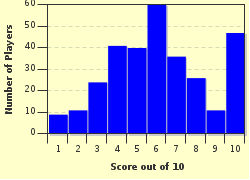Quiz Answer Key and Fun Facts
1. In which ancient practice does the word "nepotism" have its roots?
2. The phrase "Bob's Your Uncle" is fairly commonplace in English usage. Its roots come from the seemingly unjustifiable elevation of the nephew of the Marquess of Salisbury, then Prime Minister, to the position of Chief Secretary for Ireland. The nephew, however, made the most of his gift by rising to become the first new Prime Minister of the twentieth century. Who was he?
3. It's easier to get your family in on the act if you are an unchallengeable despot. When Kim Il-Sung died in 1994, responsibility for ruling the People's Republic of North Korea passed to his son, Kim Jong-il. Jong-il was not, however, declared as President of the Republic. Why not?
4. What connects the appointments of Bill Clinton's chair of the Task Force on National Health Care Reform in 1993, Nicolae Ceausescu's First Deputy Prime Minister in 1980 and Mao Zedong's deputy director of the Central Cultural Revolution Group in 1966?
5. The Gandhi-Nehru dynasty has had a stranglehold on politics in India from the time of independence from Britain. Though all of these members of the family led their party to victory in an Indian general election, which was the only one that refused to act as Prime Minister?
6. Appointed as Minister for the Armed Forces in 1959 and as Vice-President in 1976, which very patient relative formally succeeded Fidel Castro as President of Cuba in 2008?
7. Sometimes it isn't a greased path that brings the second generation of a family to the seat of power but far less pleasant circumstances. Which of the following did not become leader of their country following the assassination of a member of their family?
8. The transition of power from father to son in Syria after the unexpectedly early death of President Hafez al-Assad in 2000 was surprisingly smooth. Bashar al-Assad took office five weeks later despite the country's constitution specifically stating that he could not be President. What was it about this 34-year-old London-educated son of the former President that was the problem?
9. In the US it seems that history has very clearly favoured certain families. Each of the first 44 Presidents share a descendent with at least one other President at some point in their family tree. But very few have a direct descendent among the list of Presidents. Which of the following is NOT one that does?
10. In December 2005, Lech Kaczynski became President of Poland. In July 2006 he appointed a new Prime Minister, Jaroslaw Kaczynski, with whom he shared more than just a surname. What was the relationship between the two?
Source: Author
Snowman
This quiz was reviewed by FunTrivia editor
Terry before going online.
Any errors found in FunTrivia content are routinely corrected through our feedback system.

